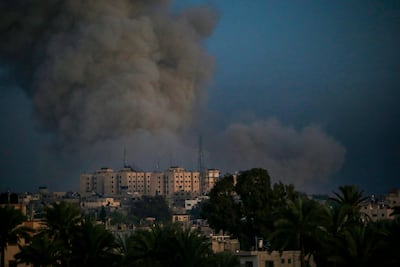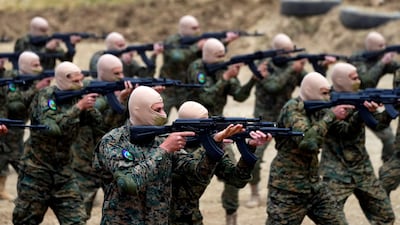Live updates: Follow the latest news on Israel-Gaza
Hezbollah said it launched more than 60 rockets at an Israeli military base on Saturday in an “initial response” to the assassination of Hamas deputy political leader Saleh Al Arouri in Beirut.
The barrage was launched a day after Hezbollah leader Hassan Nasrallah warned Israel it would face retaliation for the killing of Mr Al Arouri in a southern suburb of the Lebanese capital on Tuesday.
“As part of the initial response to the crime of assassinating the great leader Sheikh Saleh Al Arouri … the Islamic resistance [Hezbollah] targeted the Meron air control base with 62 various types of missiles,” the Iran-backed Lebanese group said in a statement.
It said the air control base on Mount Meron, the highest peak in Israel, served as a central hub for management, monitoring and air control along its northern border.
Israel has not acknowledged carrying out Tuesday's attack, which heightened concerns that its war in Gaza might lead to a broader conflict in the region. Israel's last known air strike on Beirut was during the month-long war with Hezbollah in 2006.
In his speech on Friday, Mr Nasrallah, said that “the response is undoubtedly coming” after the killing of Mr Al Arouri. Hezbollah will not “remain silent about a violation of this level because this means that all of Lebanon will be exposed”, he said.
The Israeli army said 40 rockets were fired from Lebanon towards the Mount Meron area on Saturday morning and that it targeted a “terror cell” in southern Lebanon believed to be responsible for some of the launches. The attack triggered warning sirens in northern cities, it said.
Hezbollah and other militant groups in Lebanon have engaged in near-daily exchanges of cross-border fire with Israel's military since October 8 in a bid to shift Israel's focus away from Gaza, a Palestinian territory governed by its ally Hamas.
The conflict has been contained so far, with Hezbollah showing no intention to escalate despite Israeli retaliations that have killed about 150 of its members. But concerns are rising that a slight miscalculation could trigger an all-out war
EU foreign policy chief Josep Borrell arrived in Lebanon on Friday as part of a diplomatic effort to avert an escalation, while US Secretary of State Antony Blinken visited Turkey at the start of his fourth trip to the region since the Gaza war began on October 7.
He is also scheduled to visit Greece, Jordan, Qatar, the United Arab Emirates, Saudi Arabia, Israel, the West Bank and Egypt, according to the State Department.
Rising death toll
Mr Blinken's visit comes as the death toll in Gaza continues to rise despite concerns expressed by the US, Israel's main ally, about the loss of civilian lives.
An update issued by the Gaza health ministry on Saturday put the toll from Israel's military offensive against Hamas at 22,722 killed and 58,166 injured since war began.
The ministry said 122 people had been killed and 256 injured in the previous 24 hours.
At least 18 people, including many women and children, were reported killed in a strike on Al Manara neighbourhood in Khan Younis, with three dead in an attack on a house in Deir Al Balah, as Israel conducted attacks overnight in southern and central Gaza
The Israeli army said it had found weapons and military vests belonging to the Nukhba – an elite squad of Hamas's military wing, the Qassam Brigades – in Gaza city.
The army said the vests were found in a medical facility, concealed in bags belonging to the UN refugee agency.
It also said its ground and aerial forces “eliminated numerous terrorists, destroyed tunnel shafts and a weapons storage facility” in Khan Younis.
Fighting between Israeli forces and Palestinians was also reported in the occupied West Bank’s Nablus city and Shufaat refugee camp amid raids that have been continuing for days.
Approximately 1,935,000 Palestinians have been displaced from their homes in the Gaza Strip since Israel launched its war on Hamas following raids by the group's militants on October 7, in which about 1,200 people were killed in southern Israel and about 240 others taken hostage.
Meanwhile, Gazans arriving in the already overcrowded southern city of Rafah to find safety said they were shocked by the high prices being quoted for tents and food.
“The price of one tent is around 2,000 shekels ($540),” Kamal Aouda told The National. “We are people who don’t work now and we don’t have money, so what should we do, do we have to live on the street?”

Although deliveries of humanitarian aid, including food, water, tents and medical supplies, have increased in recent weeks, the UN says the quantity is still below the levels needed.
Mr Aouda said he fled from Gaza city to Al Maghazi camp in central Gaza before being forced to move again after the Israeli army dropped leaflets asking residents to leave the camp.
“The prices of food is not double, it is triple! We are displaced from our homes and hungry, what else should happen for us?” he said.

